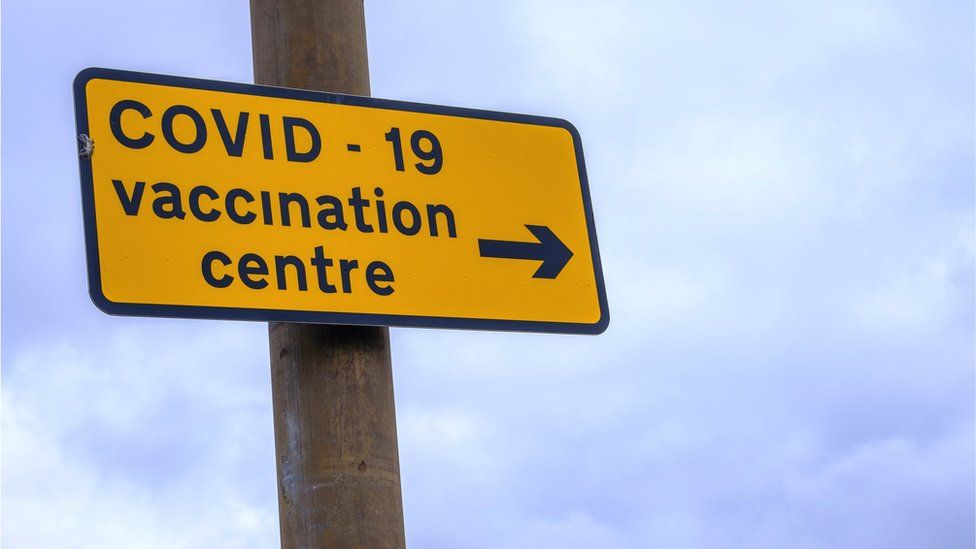 Image source, Getty Images
Image source, Getty Images
By Fergus Walsh
Medical editor
AstraZeneca is facing legal action over its Covid vaccine, by a man who suffered severe brain injury after having the jab in April 2021.
Father-of-two Jamie Scott suffered a blood clot that left him with brain damage and unable to keep working.
The action, taken under the Consumer Protection Act, alleges the vaccine was "defective" as it was less safe than individuals were entitled to expect.
In June 2022, the World Health Organization said the AstraZeneca vaccine was "safe and effective for individuals aged 18 and above".
'Stringent standards'
The legal action is at least a year away from a full court hearing.
A further claim from about 80 people who say they were injured by the AstraZeneca vaccine is also due to be launched later this year but Mr Scott's case is expected to be heard first.
AstraZeneca said: "Patient safety is our highest priority and regulatory authorities have clear and stringent standards to ensure the safe use of all medicines, including vaccines.
"Our sympathy goes out to anyone who has lost loved ones or reported health problems.
"From the body of evidence in clinical trials and real-world data, Vaxzevria [the vaccine against Covid] has continuously been shown to have an acceptable safety profile and regulators around the world consistently state that the benefits of vaccination outweigh the risks of extremely rare potential side effects."
'Wholly insufficient'
Many of the claimants have received one-off fixed tax-free payments of £120,000 under the government's Vaccine Damage Payment Scheme (VDPS), which provides compensation for those injured or to bereaved next of kin.
Official figures obtained under a Freedom of Information request showed at least 144 out of 148 VDPS payments had gone to recipients of the AstraZeneca vaccine, the Daily Telegraph reported. And an attempt to have the VDPS overhauled is at the heart of these legal actions.
Claimants have to show the vaccine caused serious disability of at least 60%. And the families say the level of compensation is wholly insufficient and has not been adjusted for inflation since 2007.
On 7 April 2021, the Joint Committee on Vaccination and Immunisation advised adults aged under 30 be offered an alternative to the AstraZeneca vaccine, "following reports of extremely rare blood clots in a very small number of people".
On 7 May 2021, the guidance was amended to apply to adults aged under 40.
Mr Scott was aged 44 when he received the AstraZeneca vaccine, on 23 April 2021.
Kate Scott, Jamie's wife, told the BBC: "Jamie has had over 250 rehabilitation sessions from specialists, he had to learn to walk again, to swallow, to talk. [He has had] memory problems.
"Although he has done very well with them we are at the point now where this new version of Jamie… is the version that will go forward. He has cognition problems…he has aphasia..severe headaches, blindness."
She added: "We need the government to reform the vaccine damage payment scheme. It is inefficient and unfair…and then fair compensation."
Not-for-profit basis
On 4 January 2021, Brian Pinker, 82, became the first person to receive the AstraZeneca Covid vaccine outside of a clinical trial.
He was given the jab in Oxford, just a few hundred metres away from the Jenner Institute, where the vaccine had been developed. The government called it a pivotal moment in the fight against the virus.
The immunisation came just weeks after the rollout of the Pfizer-BioNTech jab.
By September 2022, some 53 million people in the UK had received at least one dose of Covid vaccine.
AstraZeneca manufactured the Oxford vaccine on a not-for-profit basis. And the vaccine had saved more than six million lives in its first year of use, more than any other Covid jab, an independent study by disease-forecasting company Airfinity, published last year, estimated.
But within a few months of the AstraZeneca vaccine rollout, cases began emerging of a potential side effect from blood clots. And a condition known as vaccine-induced immune thrombosis and thrombocytopenia (VITT) was eventually identified.
The cases were so rare they had not been identified in the global trials of the vaccine.
Related Internet Links
The BBC is not responsible for the content of external sites.
 (1).png)
 1 year ago
16
1 year ago
16













